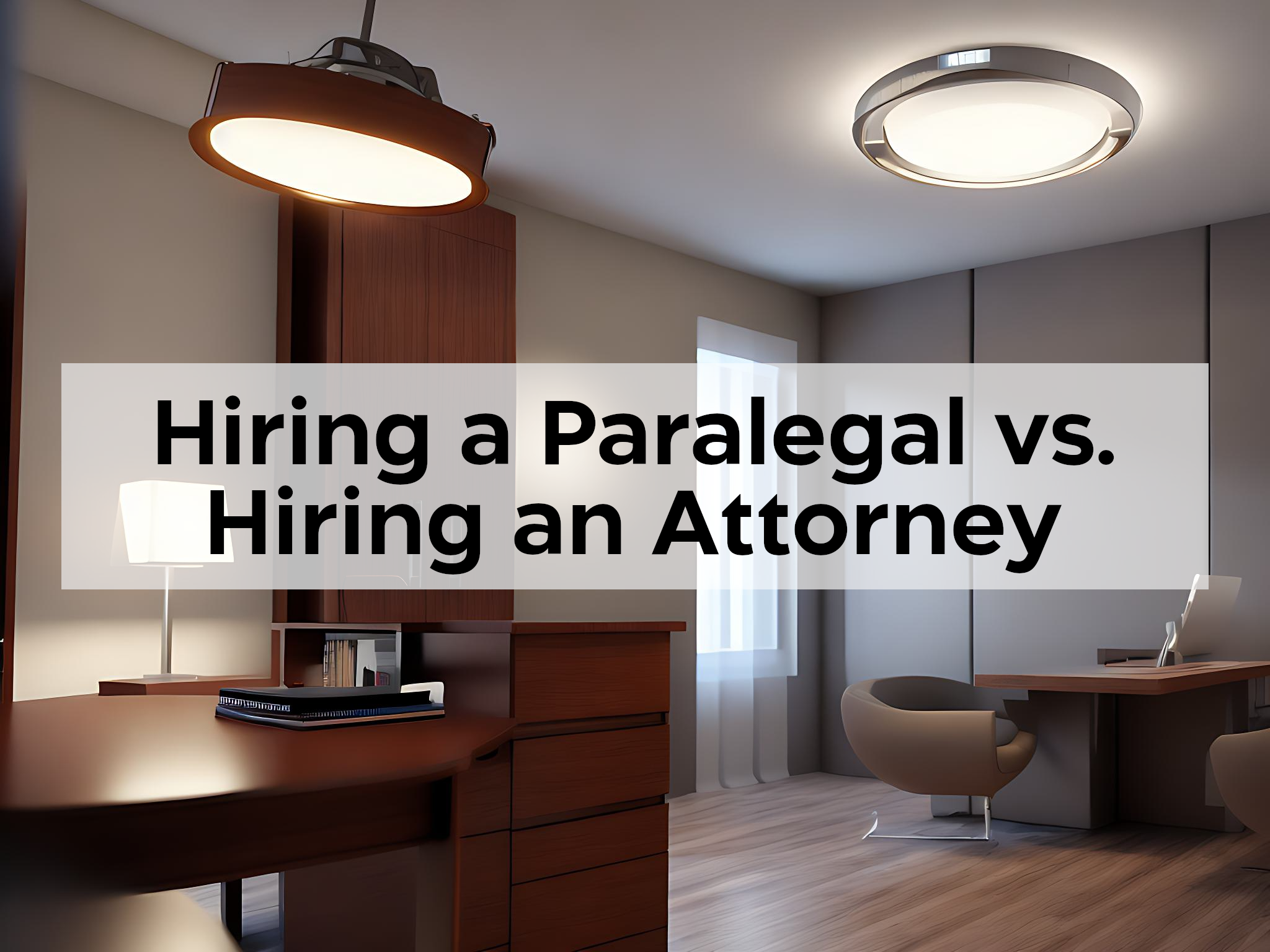DISCLAIMER: Altiorem Legal Services (hereinafter, “Altiorem”) cannot and does not provide legal advice. Altiorem is not a law firm; Altiorem’s staff are not attorneys, cannot act as attorneys, and do not act as attorneys; and any information provided by Altiorem in this article or otherwise is not a substitute for legal advice from an attorney. The information contained in this article should not be construed as legal advice, as it is not intended to be legal advice; the information in this article is provided for educational purposes only. Again, none of the information provided in this article should be construed as legal advice, and nobody should rely on or use the information contained in this article in their legal matters.
OVERVIEW
Whether one should hire a paralegal instead of an attorney, or vice-versa, will depend on the nature and complexity of the case.
The following are some factors to consider when deciding between hiring an attorney or a paralegal:
- Legal expertise: Attorneys are trained and licensed to practice law, while paralegals are trained to provide legal support services. If a case involves complex legal issues, it may be best to hire an attorney with the expertise and knowledge to handle the legal aspects of the case.
- Representation: If a client needs representation in court, an attorney is generally required, as they are the only ones who can appear in court on a client’s behalf. If the case does not involve court appearances—or if the client otherwise chooses to appear in court pro se (i.e., unrepresented and arguing on their own behalf)—a paralegal may be able to assist with, for example, legal research and drafting legal documents.
- Costs: Attorneys typically charge higher fees than paralegals. If a case is relatively simple and straightforward, a paralegal may be a more cost-effective option. However, if the case is complex and requires extensive legal expertise, hiring an attorney may be worth the extra expense.
- Risks and potential consequences: If a case involves significant risk or consequences, such as criminal charges or large amounts of money at stake, hiring an attorney rather than a paralegal is generally advisable.
In any case, it is important to do proper research and choose a reputable and experienced professional who can provide the level of legal assistance needed.
LEGAL EXPERTISE
Regarding the legal expertise of paralegals and attorneys, there are several factors to consider, such as (i) the complexity of the legal issues, (ii) the legal research and analysis required, (iii) the drafting of legal documents, (iv) negotiation and advocacy, and (v) ethical considerations.
Complexity of the legal issues: If a case involves complex legal issues beyond the scope of knowledge of a paralegal, it is likely best the education and training to navigate those complexities. Attorneys generally have a comprehensive understanding of the law and can provide legal advice and strategy to clients. However, it is important to note that experienced paralegals, such as those found at Altiorem, can navigate the complexities of legal issues as effectively as—or, depending on the experience level, perhaps even better than—some attorneys, especially those just starting out. However, even if a paralegal knows the answers to legal questions and has a firm grasp on the legal issues of a case, they may—depending on the case—not be able to help because doing so could constitute the giving of legal advice, which paralegals cannot do.
Legal research and analysis: Attorneys, and generally also paralegals, are trained in legal research and analysis, which involves identifying and interpreting legal sources such as statutes, rules, regulations, case law, and other primary and secondary sources. Both paralegals and attorneys can use this research to build a strong case and argue their client’s position effectively. When contemplating whether to hire a paralegal or an attorney in this regard, it may be important to consider that a paralegal’s legal services are usually substantially more affordable than an attorney’s legal services.
Drafting legal documents: Attorneys, and generally also paralegals, have knowledge and experience drafting legal documents such as pleadings, motions, memoranda, letters, contracts, etc. Generally, both an attorney and a paralegal can ensure that the legal documents accurately reflect the client’s intentions and comply with legal requirements. When contemplating whether to hire a paralegal or an attorney in this regard, it may be important to consider that a paralegal’s legal services are usually substantially more affordable than an attorney’s legal services.
Negotiation and advocacy: While either a paralegal or an attorney can generally help prepare a negotiation if a case requires advocacy, an attorney would be the most appropriate individual to request advocacy services from, as paralegals cannot actively advocate for clients concerning their legal issues. Unlike a paralegal, an attorney can represent a client in negotiations and advocate on the client’s behalf in court.
Ethical considerations: Attorneys—and, generally, by extension, also paralegals—are bound by ethical rules and standards, which means that they must prioritize a client’s best interests and act with integrity with respect to the legal services provided to the client. If a case involves ethical considerations, an attorney or a paralegal can guide how to navigate those issues. When contemplating whether to hire a paralegal or an attorney in this regard, it may be important to consider that a paralegal’s legal services are usually substantially more affordable than an attorney’s legal services.
Ultimately, the level of legal expertise required for a case—whether this expertise comes from a paralegal or an attorney—will depend on the case’s complexity and the potential consequences.
REPRESENTATION
Representation is appearing on another’s behalf in court or a legal proceeding. In most cases, only licensed attorneys, not paralegals, are allowed to represent clients in court, although there are some exceptions where non-attorneys may be permitted to represent clients in certain administrative hearings or proceedings.
When it comes to obtaining legal representation from an attorney, there are several factors to consider, such as (i) court appearances, (ii) legal strategy, (iii) evidence and witnesses, and (iv) settlement negotiations.
Court appearances: If a case involves court appearances, the client will likely need an attorney to represent them. Alternatively, a litigant can appear in court pro se—i.e., unrepresented and arguing on their own behalf—and in such a scenario, a paralegal may be the optimal choice for helping the client with all other aspects of the case, such as document drafting and preparation for court appearances. Attorneys have the legal knowledge and experience to navigate court procedures and can argue a case before a judge or jury.
Legal strategy: Attorneys and paralegals can help develop legal strategies that can help achieve a desired outcome in court. They can identify legal arguments that support a case and anticipate and respond to arguments made by the opposing party. A paralegal may be able to help develop legal strategies, but they cannot give legal advice to clients based on those strategies. When contemplating whether to hire a paralegal or an attorney in this regard, it may be important to consider that a paralegal’s legal services are usually substantially more affordable than an attorney’s legal services.
Evidence and witnesses: Both attorneys and paralegals can help gather evidence and witnesses for court, but only attorneys can present said evidence and witnesses in court. Attorneys, unlike paralegals, can also cross-examine witnesses and challenge the evidence presented by the opposing party. When contemplating whether to hire a paralegal or an attorney in this regard and considering a paralegal’s limitations, it may be important to consider that a paralegal’s legal services are usually substantially more affordable than an attorney’s.
Settlement negotiations: Attorneys and paralegals can help prepare settlement negotiations, but only attorneys may represent a client in settlement negotiations. Attorneys and paralegals can help evaluate settlement offers, and attorneys can negotiate favorable terms on the client’s behalf. When contemplating whether to hire a paralegal or an attorney in this regard and considering a paralegal’s limitations, it may be important to consider that a paralegal’s legal services are usually substantially more affordable than an attorney’s.
In some cases, a paralegal may be able to assist with legal research, document preparation, and other legal support services, but they are not authorized to represent a client in court.
If a client needs representation in court, hiring an attorney with legal expertise and experience is generally advisable to advocate for the client effectively.
COSTS
The cost of hiring an attorney or a paralegal can vary widely depending on the nature and complexity of a case, as well as the experience and qualifications of the professional chosen to work with. However, the services of a paralegal are generally substantially more affordable than the services of an attorney.
Here are some factors to consider regarding costs:
- Hourly rates: Attorneys typically charge higher hourly rates than paralegals due to their higher level of education, experience, and expertise. However, the hourly rate of a paralegal or an attorney can also vary depending on their respective level of experience and the complexity of the case.
- Retainer fees: Both attorneys and paralegals may require a retainer fee, which is a deposit paid upfront to cover the initial costs of their services. Attorneys and paralegals typically charge by the billable hour in conjunction with a retainer, subtracting the amounts of the number of hours worked from the retainer amount until the retainer is exhausted, after which they continue billing per hour and then charge those hours to the client as a regular invoice upon the payment schedule typically agreed to at the beginning. The retainer fee is typically based on an estimate of the total cost of the services of an attorney or paralegal, and it can vary widely depending on the nature and complexity of the case.
- Flat fees: Some attorneys or paralegals may offer a flat fee for certain services, such as drafting a contract or preparing a will. This option can be cost-effective if one’s legal needs are relatively simple and straightforward.
- Paralegal fees: Paralegals typically charge lower fees than attorneys due to their—typically but not always—lower level of education, experience, and expertise. However, this is not always the case, as several paralegals actually have law degrees, as well as substantive experience and expertise—in some cases, even more than attorneys— Notwithstanding, the hourly rate of a paralegal can still vary depending on the paralegal’s level of education, experience, and expertise, and the complexity of the case.
- Potential savings: In several instances, a paralegal can perform many of the duties of an attorney but for a significantly lesser cost than an attorney. This provides an avenue for lower-income individuals to obtain needed legal services.
Ultimately, the cost of hiring an attorney or a paralegal will depend on the specific services needed and the level of legal expertise required for the case.
It is important to research and compare the fees of different professionals to determine the best option for one’s budget and legal needs.
RISKS AND POTENTIAL CONSEQUENCES
The level of risk and potential consequences involved in a case are important factors to consider when deciding whether to hire an attorney or a paralegal. Some examples of this are as follows:
- Criminal charges: If one is facing criminal charges, the potential consequences can be severe, including jail time, fines, and a criminal record. In such cases, hiring an attorney who can provide legal representation and defend one’s rights in court is highly recommended. A paralegal, in such a situation, may be able to help a client with document drafting and other clerical or administrative tasks, but they would not be able to directly defend the client against the criminal charges.
- Civil lawsuits: If one is being sued or is considering filing a lawsuit, the potential consequences of this can include financial damages or other court orders that could impact one’s future. In such cases, an attorney or a paralegal can help the client navigate the legal system and develop a legal strategy to protect their interests. A paralegal can, for example, help the client draft the required legal documents, but the paralegal would not be able to represent the client—that is an attorney’s domain. When contemplating whether to hire a paralegal or an attorney in this regard and considering a paralegal’s limitations, it may be important to consider that a paralegal’s legal services are usually substantially more affordable than an attorney’s.
- Business transactions: If the client’s legal needs involve business transactions or contracts, a significant amount of money may be at stake. In such cases, an attorney can help the client negotiate favorable terms, and either a paralegal or an attorney can draft legally binding agreements that protect the client’s interests.
- Family law: Family law cases, such as divorce or child custody, can have significant emotional, financial, and other portentous temporal consequences. An attorney or a paralegal can usually help the client draft the required legal documents and navigate the pertinent legal issues; however, when providing legal advice and representation, an attorney would be the correct party whose services to procure. In such cases, an attorney or a paralegal can help the client achieve the best possible outcome for the client and the client’s family.
In general, the higher the potential risks or consequences of the client’s case, the more important it is to hire an attorney or a paralegal with the legal knowledge, expertise, and experience to protect and defend the client’s interests effectively.
While a paralegal can provide legal support services, such as document drafting, they are not authorized to provide legal advice or represent clients in court, which may not be adequate in high-risk situations.
CONCLUSION
In conclusion, deciding whether to hire an attorney or a paralegal to assist with one’s legal needs depends on several factors, including the complexity of the case, the level of legal expertise required, the need for representation in court, the potential consequences of the case, and one’s budget.
While paralegals can provide valuable legal support services, they are not authorized to provide legal advice or represent clients in court, which may be necessary in certain situations.
On the other hand, attorneys generally have the legal education, training, and experience to provide legal advice, represent clients in court, and develop legal strategies that can help the client achieve their desired outcome.
Therefore, it is important to carefully evaluate one’s legal needs and the potential consequences of one’s case to make an informed decision about whether to hire an attorney or a paralegal.
CONTACT US TODAY!
Do you need help with deciding upon legal representation? Let Altiorem help you today with affordable, top-quality legal services.
Expertise. We are knowledgeable, skilled, and experienced in the process of hiring legal representation and in drafting all manner of legal documents, such as briefs, pleadings, motions, memoranda, letters, contracts, etc. If you need a top-quality, professional, excellently written, well-researched, and compelling legal document drafted, then look no further!
Quality. We produce top-quality, properly written legal documents with impeccable grammar, punctuation, spelling, structure, flow, information, compelling legal arguments, and persuasive legal conclusions. You can see the quality of our work on our work samples page, where you can peruse and evaluate our writing, as well as our other blog posts.
Experience. Our paralegals are highly experienced in working with attorneys, other paralegals, and court personnel.
Customer Care. Navigating the Utah legal system can be daunting and confusing. Let Altiorem relieve your stress and be your guide. Altiorem has a team of professional paralegals ready to work for you. We want to give you the best chance at getting an outcome for your case that you will be happy with. We are happy to receive documents via email from you, speak with you on the phone, look through court files, or even translate documents (English / Spanish)!
Accessible. If you are interested in retaining our services, we can be contacted at (801) 855-6541 (text or call) and at altiorem@altioremlegalservices.com. If you have a project in mind that you would like us to work on, please click here to send us a project request and get a quote. Alternatively, you can send us an email detailing the work you need to be performed, and a real person will respond promptly.
Thank you for your attention and consideration.



